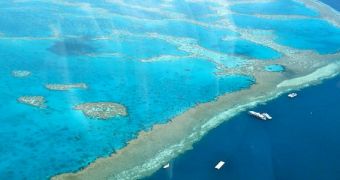Researchers at the University of Queensland announce in a new report that global warming needs to be kept below 2 degrees Celsius by 2030, if the Great Barrier Reef of Australia is to have any chance of surviving the damage it has already taken. The situation, experts argue in the document, is more dire than previous researches have suggested so far.
Another report, released by the Australian Institute of Marine Science (AIMS) in 2012, shows that the Great Barrier Reef has lost no less than 27 percent of its coral cover over the past 27 years, in part due to ecological pressure from humans and our activities. Some 48 percent of the loss was accounted for by storm damage, 42 percent by crown of thorns starfish, and 10 percent by bleaching.
The main threat the reef faces today, the new document argues, is that it may soon cease to be a coral-dominated ecosystem. This does not mean that the entire GBR will be destroyed or disintegrated, but other species will become dominant in this ecosystem. This would be a disaster because it is the presence of corals that makes the Great Reef display such extreme biological diversity.
The international scientific community agrees that global warming needs to be kept below 2 degrees Celsius when compared to levels recorded in pre-industrial times. However, politics have impeded any meaningful international treaty on this issue for the past 5 years or so. As such, it is highly unlikely that strong steps will be taken to address this issue.
The new report catalogs coral bleaching – a process caused by numerous factors in which corals leave their skeletons and drift away – as a serious threat, rather than a danger. Bleaching was first observed in the GBR back in 1979.
“Corals can exist in temperatures 1ºC higher than the current summer maximum, but beyond that you get coral bleaching and mass mortality. Beyond 2ºC, you don’t really have coral dominated reefs anymore and there’s evidence that 1.5ºC is beyond the limits too,” says expert Ove Hoegh-Guldberg for Guardian Australia.
The investigator, a coauthor of the new document, holds an appointment as the director of the Global Change Institute at the University of Queensland. He and his group conducted their investigation in a natural laboratory on Heron Island. The expert warns that our current pollution rates will raise global temperatures by up to 4ºC over the next few decades.
“Even under the best-case scenario of 2ºC, corals disappear. But with business as usual, it’s game over. You look in the tank and the corals have died, bacteria have taken over, the sand has dissolved,” he concludes.

 14 DAY TRIAL //
14 DAY TRIAL //